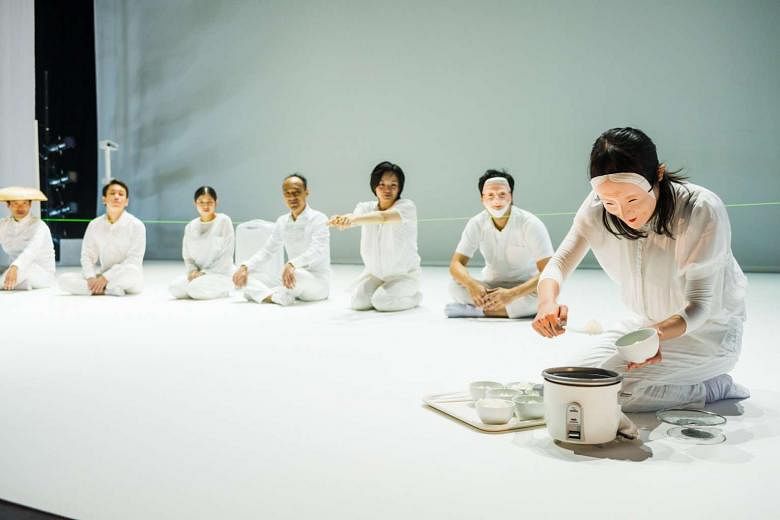SEED
The Finger Players in association with the Asian Performing Arts Festival and Tokyo Metropolitan Theatre
Sota Drama Theatre/Oct 29
Food, love and death are inextricably tangled in Asian culture, as this play constantly reminds us. Koreans commemorate a dead king with a day of feasting, the Chinese venerate ancestors by leaving food out during the Hungry Ghost Festival and at the start of Seed, a Japanese man's dying wish is to return to the rice fields he tilled with his father and brother. Rice fields that have been worked by his family for generations in a cycle of sowing seeds and harvesting the crops provide a tangible continual link through the generations, connecting first ancestor to last descendant.
Watching a play in which agricultural cycles of growing and reaping are a metaphor for human life and death takes on particular poignancy in urban Singapore where many in the audience would have little personal investment in the food they eat. The cast pulls green threads across the stage to represent rice fields and also the organic nature of human connections. Red threads seem to represent both the barriers between our understanding of each other and the inorganic means by which humans interact - telephone lines, television screens, even the cloud of radiation from the Fukushima nuclear disaster which spread into the air and water surrounding Japan. Red seems to overpower the green, even as it is an ironic nod to the "red thread of fate" that connects people destined to meet or be important to each other, according to Japanese culture.
The play's title in Japanese "ueru" could mean "to grow" or "to starve" and Seed explores how one might try to fill the hollows in the soul left by the loss of a loved one. It is a tight cat's cradle of a play about what binds humans together - we all hunger, we all die - and this is evident in text, sub-text and structure. The play premiered in Tokyo last year and is performed mostly in Japanese and some English, with surtitles in either language as required. Director and playwright Chong Tze Chien does not speak Japanese but has coaxed such a riveting performance from his Japanese cast that members of the audience around me, whether or not they spoke the language, leaned forward and laughed and sighed and held their breath in tandem with the action on stage.
The actors are superb, projecting joy, sorrow and comedy perfectly from beneath outrageous paper hats or masks - this is so well done that one is shocked when painted lips do not open to swallow a mouthful of rice. The actors switch seamlessly between multiple roles - a canny housewife becomes a pouting young journalist, a drunken farmer turns into a deadpan airline employee - while their white costumes and the spare stage allow the ubiquitous threads to display red or green and set the tone.
Seed is about cycles, about the fact that we die and maybe leave another generation behind to carry on the work, just as rice plants yield grains and then return to the earth to nourish a new crop. But a disaster like the nuclear meltdown at Fukushima poisons the soil and strips it of its place in the cycle, adding a layer of uncertainty to the final scene of family satiety. There are also unanswered questions about the fate of some of the secondary characters, whose stories end abruptly and without granting the viewer closure. But then the Japanese have a saying - eat until the stomach is 80 per cent full. Or as it is said in English: leave them hungry for more, and this the play certainly does.
book it
Seed
Where: School of the Arts Drama Theatre
When: 8pm until Oct 31
Tickets: $35, $40, $45 from Sistic. Call 6348-5555 or go to sistic.com.sg.


